Odd Man Out Blu-ray Movie
HomeOdd Man Out Blu-ray Movie 
Criterion | 1947 | 116 min | Not rated | Apr 14, 2015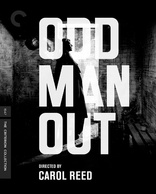
Movie rating
7.9 | / 10 |
Blu-ray rating
| Users | 5.0 | |
| Reviewer | 4.0 | |
| Overall | 4.3 |
Overview
Odd Man Out (1947)
A revolutionary ex-con leads a robbery that goes horribly wrong. Injured and hunted by the police, he seeks refuge throughout the city, while the woman he loves searches for him among the shadows.
Starring: James Mason (I), Robert Newton, Cyril Cusack, F.J. McCormick, William HartnellDirector: Carol Reed
| Drama | Uncertain |
| Film-Noir | Uncertain |
| Crime | Uncertain |
| Thriller | Uncertain |
Specifications
Video
Video codec: MPEG-4 AVC
Video resolution: 1080p
Aspect ratio: 1.37:1
Original aspect ratio: 1.37:1
Audio
English: LPCM Mono (48kHz, 24-bit)
Subtitles
English SDH
Discs
50GB Blu-ray Disc
Single disc (1 BD)
Playback
Region A (locked)
Review
Rating summary
| Movie | 4.5 | |
| Video | 4.0 | |
| Audio | 4.0 | |
| Extras | 4.0 | |
| Overall | 4.0 |
Odd Man Out Blu-ray Movie Review
Reviewed by Dr. Svet Atanasov March 18, 2015Nominated for the prestigious Golden Lion Award at the Venice Film Festival and winner of BAFTA Award for Best British Film, Carol Reed's "Odd Man Out" (1947) arrives on Blu-ray courtesy of Criterion. The supplemental features on the disc include new video interview with cinema scholar John Hill; new video interview with music scholar Jeff Smith; the documentary film "Home, James" (1972); radio adaptation of the film; and more. The release also arrives with an illustrated leaflet featuring an essay by critic Imogen Sara Smith. In English, with optional English SDH subtitles for the main feature. Region-A "locked".
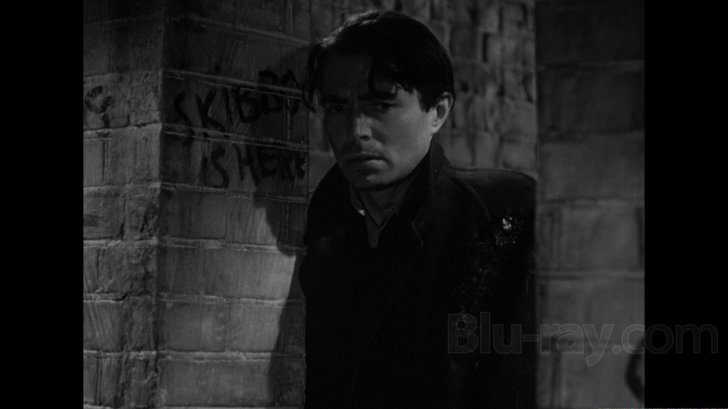
Johnny
Johnny McQueen (James Mason, Lolita, Cross of Iron) and his boys have been working hard to make sure that nothing could go wrong with their next job -- robbing a big mill. They know that it won’t be an easy one, but The Organization needs the money. Before they leave, Johnny promises Kathleen (Kathleen Ryan, The Yellow Balloon), the woman he loves, that he and the boys will be back in no time.
At first, it seems like everything would go according to plan. Johnny and the boys enter the mill and take the money without much trouble. But on the way out a man fires his gun, and Johnny is forced to kill him. Seriously wounded, Johnny jumps in the getaway car -- but then falls from it. His boys decide to leave him behind and quickly disappear.
Exhausted and bleeding, Johnny hides in an empty basement not too far away from the mill. Soon after, he begins hallucinating. Meanwhile, his boys go back to their hideout and start debating what to do to help Johnny.
The police begin searching for Johnny around the mill and later on in the heart of the city. Checkpoints are erected and people are asked to show their identity cards. Eventually, it becomes virtually impossible to get out of the city.
Realizing that help isn’t coming, Johnny leaves the basement and starts making his way back to Kathleen and his friends. He tries to stay in the back alleys, where no one could recognize him, but the cold snow, his bleeding wound and the patrolling cops make the journey a tricky one.
The film has a fabulous atmosphere. Once Johnny begins his journey those big noir shadows come alive and the tone of the film changes dramatically. There is a very heavy sense of fatalism in the air that also gives the film quite an edge.
'The Organization' is clearly the IRA and the dangerous city Belfast, but neither of the two is identified in the film. There are no specific political messages either. However, there is a whiff of pro-British propaganda, primarily detectable through the actions of the secondary characters, which are either not overly enthusiastic about 'The Organization' and its fight or simply side with the police because it is supposedly the right thing to do.
The entire cast is excellent, but Mason clearly deserves the most credit. His facial expressions are so good they ought to be studied. Ryan’s time in front of the camera is limited, but she also leaves a memorable impression. There is also a strong cameo by the great Robert Newton (This Happy Breed), who plays an extravagant artist with a serious drinking problem.
Odd Man Out was lensed by cinematographer Robert Krasker, who had previously worked with Laurence Olivier on Henry V and David Lean on Brief Encounter. In 1949, Krasker once again collaborated with director Reed, this time on the excellent The Third Man.
William Alwyn’s (A Night to Remember) score deserves a special mention as it is arguably one of the very best ever done for a noir film. The main theme, in particular, which often appears as Johnny wanders through the back alleys, is terrific.
Note: In 1947, Odd Man Out was nominated for the prestigious Golden Lion Award at the Venice Film Festival. A year later, the film earned BAFTA Award for Best British Film.
Odd Man Out Blu-ray Movie, Video Quality 
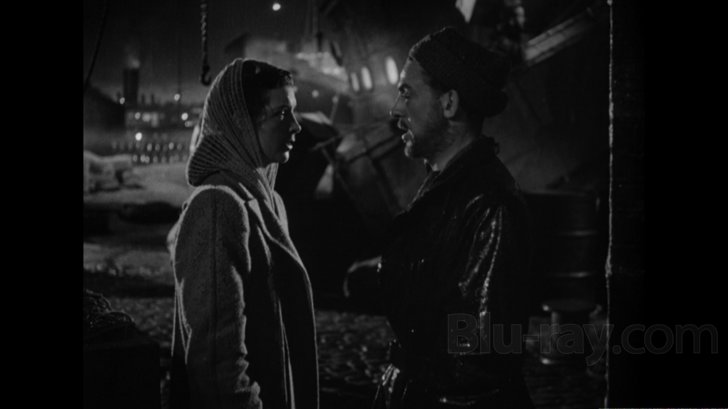
Presented in its original aspect ratio of 1.37:1, encoded with MPEG-4 AVC and granted a 1080p transfer, Carol Reed's Odd Man Out arrives on Blu-ray courtesy of Criterion.
The following text appears inside the leaflet provided with this Blu-ray release:
"This new high-definition digital transfer was created on a Spirit DataCine film scanner from a new 35mm composite fine-grain made from the original nitrate negative, provided by the BFI National Archive. Thousands of instances of dirt, debris, scratches, splices, and flicker were manually removed using MTI's DRS and Pixel Farm's PFClean, while Digital Vision's DVNR and Phoenix were used for small dirt and stabilization.
Transfer supervisor: Lee Kline.
Colorist: Trevor Brown: Deluxe Digital London."
Criterion's presentation of Odd Man Out has little in common with British Network's presentation of the film (you can see our review of the British release here). Generally speaking, on the Criterion release the film appears slightly softer and brighter. Interestingly enough, while in select darker sequences clarity tends to be better on the British release, on the Criterion release shadow definition is in fact superior. For example, compare screencapture #8 with screencapture #3 from our review of the British release. Here clarity appears to be better on the British release, but there is in fact more visible information on the Criterion release -- see the wall on the right side of the frame. However, on the left side of the frame the brick wall actually appears better detailed on the British release. Obviously, it is easy to see that there is light black crush on the British release and sharpness levels appear to have been elevated, but the Criterion release also appears marginally softer. Elsewhere, however, some of these discrepancies are reversed. For example, compare screencapture #15 with screencapture #14 from our review of the British release. On the bottom left corner there is more visible information on the British release while on the Criterion release the image appears too dark. Furthermore, the overwhelming amount of the light scratches that are visible on the British release have been either removed or toned down on the Criterion release. Whether the work is as effective as it should have been, however, something that can be debated as at least some of the sporadic softness on the Criterion release can be traced back to the digital cleanup. Grain is visible throughout the entire film, but it does fluctuate. This should not be surprising, however, as it is very easy to see that time has left its mark. Overall image stability is good, but there are sequences where a few frames appear a bit shaky. All in all, I think that the ideal presentation of Odd Man Out most likely should be a hybrid of the British release and Criterion's upcoming release. I like the better balanced and more convincing organic appearance of the Criterion release as it eliminates a lot of the harshness from the British release, but in select areas clarity (and I am not referring to the light sharpening) is in fact better on the British release. (Note: This is a Region-A "locked" Blu-ray release. Therefore, you must have a native Region-A or Region-Free PS3 or SA in order to access its content).
Odd Man Out Blu-ray Movie, Audio Quality 
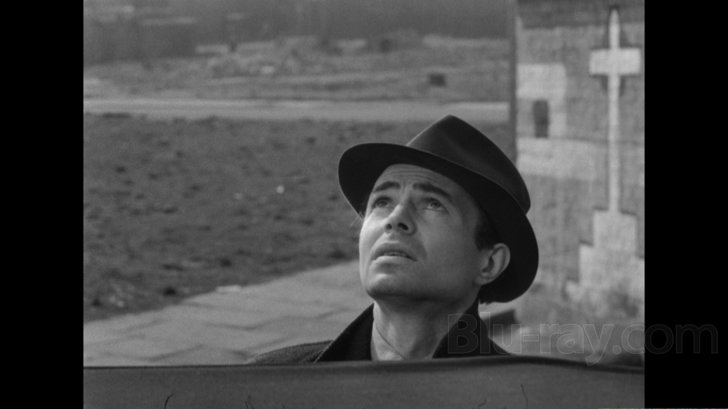
There is only one standard audio track on this Blu-ray release: English LPCM 1.0. Criterion have provided optional English SDH subtitles for the main feature.
Dynamic intensity is rather limited, but this should not be surprising considering the age of the film. The dialog is crisp, stable, and easy to follow. William Alwyn's (The Fallen Idol, A Night to Remember) dynamic score also breathes quite well. There is no problematic background hiss, but some extremely light unevenness in the high-frequencies can be felt (it is also present on the British release).
Odd Man Out Blu-ray Movie, Special Features and Extras 

- Templates for the Troubles: John Hill on Odd Man Out - in this brand new video interview, cinema scholar John Hill, author of Cinema and Northern Ireland: Film, Culture, and Politics, discusses the political events that inspired Odd Man Out and the depiction of Northern Ireland in the film, some of the key differences between F.L. Green's novel and Carol Reed's film (for example, the fact that the film is a lot more sympathetic to The Organization), interesting historic events (IRA's willingness to collaborate with the Nazis), some of the locations where major parts from the film were shot, etc,. The interview was conducted exclusively for Criterion in 2014. In English, not subtitled. (24 min, 1080p).
- Postwar Poetry: Carol Reed and Odd Man Out - this documentary film takes a closer look at the production history of Carol Reed's Odd Man Out, F.L. Green's novel, the film's visual style (and specifically its documentary look), the main characters personalities and the dilemmas they face, etc. Included in the documentary are interviews with film historian Charles Drazin, writer and film historian Tony Rayns, film historian Peter Evans, director John Boorman (Deliverance), and director Guy Hamilton (Goldfinger). The documentary was made exclusively for Criterion in 2014 by White Dolphin Films. In English, not subtitled. (16 min, 1080i).
- Home, James (1972) - a wonderful documentary film on James Mason. The film is narrated by the acclaimed actor, who travels back to his home town of Huddersfield. In English, not subtitled. (54 min, 1080p).
1. Change of heart
2. Industry
3. The people
4. Upbringing
5. Old ways
6. Sports
7. Connections
- Collaborative Composition: Scoring Odd Man Out - in this brand new video interview, film music scholar Jeff Smith, author of The Sounds of Commerce, composer William Alwyn legacy and career as well as his unconventional score for Odd Man Out (and specifically the integration of music and effects, the use of silence, the relationship between the main A/B music themes, etc). The interview was conducted exclusively for Criterion in 2014. In English, not subtitled. (21 min, 1080p).
- Suspense, Episode 460 - this radio adaptation of Odd Man Out stars James Mason, Pamela Kellino, and Dan O'Herlihy and was originally broadcast on February 11, 1952. It was produced and directed by Elliott Lewis. In English, not subtitled. (30 min, 1080p).
1. Unbeatable team
2. Inescapable nightmare
3. Smooth performance
4. A desperate State
5. Saluting the leaders
- Leaflet - an illustrated leaflet featuring an essay by critic Imogen Sara Smith.
Odd Man Out Blu-ray Movie, Overall Score and Recommendation 
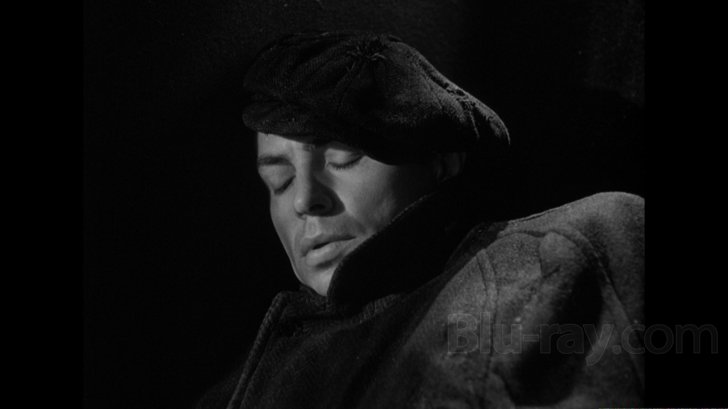
The Third Man is rightfully considered to be Carol Reed's masterpiece, but there are certain aspects of Odd Man Out that are better. William Alwyn's score, for instance, may well be one of the very best ever done for a noir film. Criterion's technical presentation of Odd Man Out is good, but has little in common with Network's presentation of the film. As far as supplemental features are concerned, I think that Criterion's selection is clearly better. HIGHLY RECOMMENDED.
Similar titles
Similar titles you might also like

The Killers
1946

They Live by Night
1948

The Asphalt Jungle
1950

The Night of the Hunter
1955

The Killers
1964

Mr. Arkadin
1955

High Sierra
1941

Good Time
2017

Gun Crazy
1950

Thief 4K
Director's Cut
1981

No Orchids for Miss Blandish
1948

Storm Fear
1955

Ace in the Hole
1951

Underworld U.S.A.
Limited Edition to 3000
1961

The Friends of Eddie Coyle
1973

Hell or High Water 4K
2016

The Getaway
1972

One False Move 4K
1992

Child of God
2013

Underworld
1927